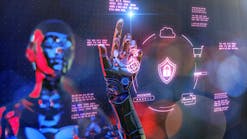Surge in antisemitism amid Israel-Hamas war marks ‘frightening time’ for Jews globally
Rodi Glass survived the Holocaust as a child growing up under Nazi occupation in the Netherlands, where she was forced to wear a yellow Star of David sewn to her clothing to identify herself as a Jew at the age of 6.
Eight decades later, the 87-year-old Highland Park resident is disturbed by an unsettling spike in antisemitic incidents and rhetoric amid the Israel-Hamas war, marking a particularly threatening era for Jews locally as well as globally.
“It’s a very uncertain time for Jewish people,” she said. “It’s a very frightening time.”The Anti-Defamation League said it has tracked a dramatic surge in antisemitic events nationwide following the Oct. 7 Hamas attack on Israel, which plunged the region into a bloody ongoing war. The New York-based watchdog group recorded more than 300 antisemitic incidents in just over two weeks following the attack, a 388% increase over the same period last year, according to a report released Tuesday.
The rise over the last few weeks comes on the heels of a marked overall increase in antisemitism nationwide over the last few years, ADL data shows.
Several recent incidents in Illinois are highlighted on an interactive map on the organization’s website, including one where a swastika was allegedly carved into an elementary school playground in the western suburbs and another where propaganda was allegedly placed on parked cars in western Illinois, according to the ADL.
In mid-October, an Illinois comptroller’s office employee was fired after making antisemitic comments on social media, including telling another Instagram user that “all Zionists will pay” and “Hitler should have eradicated all of you.”
Nearly 300,000 Jews live in the Chicago area, according to the nonprofit Jewish United Fund of Metropolitan Chicago.
The ADL report identified more than 100 protests and rallies around the country where the group “found explicit or strong implicit support for Hamas and/or violence against Jews in Israel” in signs, flyers and other materials. In the Chicago area, screenshots provided by the ADL show protest signs and memes circulated by local groups on social media that included images of paragliders — which appear to reference the paragliders Hamas used to invade Israel in the surprise attack, which left more than 1,400 Israelis dead.
Cases of alleged harassment, vandalism and violence targeting Jewish populations have been chronicled across the country in recent media reports.
In New York at Grand Central Terminal earlier this month, a man allegedly punched a Jewish woman in the face; when the woman asked why, he allegedly responded,“because you’re Jewish.”
A Los Angeles home break-in earlier this week is being investigated as a possible hate crime; the suspect was heard screaming, “Free Palestine,” and “Kill Jews, kill Jews,” according to a Los Angeles police news release. The suspect, “possibly suffering from mental illness, acted alone and his actions appeared motivated by the victims’ religious beliefs,” the release added.
Internationally, Greek media recently reported that a Jewish Holocaust mural in Thessaloniki was defaced with the words “Free Gaza” and “Jews=Nazis.” The German chancellor earlier this month condemned the firebombing of a synagogue in Berlin, after assailants threw two Molotov cocktails, which burst on the sidewalk next to the house of worship, according to The Associated Press. The United Kingdom’s immigration minister recently announced that visa holders could be expelled for inciting antisemitism, even if the actions aren’t criminal.“There’s antisemitic tropes being spread and there’s outright antisemitism,” said ADL Midwest Regional Director David Goldenberg. “When that’s occurring in our streets, when that’s occurring in our press, when that’s occurring in social media, it’s unfortunately not a surprise when you see a dramatic uptick in antisemitic incidents. And that’s exactly what we’ve seen.”
Palestinian Americans and Muslims in the Chicago area and across the country have also faced an uptick in alleged hate crimes and bigotry since the war began, including the shocking fatal stabbing of 6-year-old Wadea al-Fayoume in unincorporated Plainfield Township earlier this month. Prosecutors have said the suspect, the landlord of the apartment where the Palestinian American boy lived with his mother, was spurred to attack after listening to conservative talk radio coverage of the Israel-Hamas war.
The landlord faces multiple charges including first-degree murder, aggravated battery and hate crime. The boy’s mother was severely injured in the attack and but has been released from the hospital.
The Department of Homeland Security and the Federal Bureau of Investigation on Wednesday warned of “potential threats in the United States from a variety of actors in response to the Hamas attacks on Israel.”
The announcement noted that “the volume and frequency of threats to Americans, especially those in the Jewish, Arab American, and Muslim communities in the United States, have increased, raising our concern that violent extremists and lone offenders motivated by or reacting to ongoing events could target these communities.”
President Joe Biden on Wednesday addressed the nation’s heightened climate of fear, discrimination and bigotry.
“We must, without equivocation, denounce antisemitism,” he posted on X, the site formerly known as Twitter. “We must, without equivocation, denounce Islamophobia. To all of you hurting: You belong. You’re all America.”
To Glass, the flagrant nature of recent antisemitic incidents has been particularly troubling. She noted that “antisemitism has always been around, but now it’s more on the surface.”
“Now it’s like the world is on fire,” she said. “Like all the hate is coming to the surface. And I always say that hate is such a useless emotion. Why do you have to hate? It is a scary time in this world. I really am worried (about) what the end of this is going to be.”
‘Creeping into the mainstream’
While antisemitism and bigotry have always existed, what’s most concerning is that these ideologies are no longer relegated to the margins of society, said Bernard Cherkasov, CEO of the Illinois Holocaust Museum & Education Center in Skokie.
Social media can also amplify hateful rhetoric and antisemitism, widening the audience. He noted that his 13-year-old daughter plays video games online. Even on those virtual platforms used by children, swastikas and antisemitic rhetoric have been discovered.
Also troubling are elected officials who “trade in antisemitic tropes.” he added. One example he pointed to was a statement made in 2021 by U.S. Rep. Mary Miller, a Republican who represents a downstate Illinois district. Miller said that “Hitler was right on one thing. He said, whoever has the youth has the future,” which drew strong rebuke from Republicans and Democrats alike. Miller, a Naperville native, apologized for the reference while accusing others of “intentionally trying to twist my words.”
“It’s creeping into the mainstream,” said Cheraksov, who fled antisemitism as a refugee from Azerbaijan at the age of 13. “It’s now people with megaphones who are validating those antisemitic lies.”
While the proliferation in antisemitic incidents over the past few weeks has been conspicuous, the nation has been seeing a steep rise in antisemitism for several years, according to ADL data.
Last year, the organization cited 3,697 antisemitic incidents nationwide, a 36% increase from the 2,717 cases counted in 2021. This was the highest annual number since the ADL began chronicling antisemitic incidents in 1979, according to an ADL report released earlier this year. The report found a rise in harassment, vandalism, white supremacist propaganda, Holocaust denialism, bomb threats targeting Jewish institutions and other forms of antisemitism.
In Illinois, the organization tracked 121 incidents in 2022, including instances of harassment and vandalism; this was a steep rise from 53 incidents in 2021, according to an ADL report,“Hate in the Prairie State: Extremism and Antisemitism in Illinois,” which was published Oct. 3, just a few days before the Hamas attack.
“Jews are scarred by our history,” Goldenberg said. “We’re at a time when antisemitic attitudes in the United States haven’t been this high in nearly three decades. ... So, we are scarred by our history. But we are also informed by our history.”
He added that it’s even more important now that Jews and allies speak out against “antisemitism and lies with facts and show strength — not only for our community but for other communities that are targeted as well.”
Sometimes those messages can be simple: Glass, who lived through the Holocaust as a young girl, said she’s received many texts and emails from non-Jewish friends expressing their support and wishing her peace over the past few weeks.
“Just tell them that you’re thinking of them,” she said. “Just to know they’re thinking of you at this difficult time is nice.”
Resilience, solidarity, progress
The new 27,000-square-foot Chabad Center for Jewish Life is located in a prominent spot in the heart of the University of Illinois at Urbana-Champaign campus, on Armory Avenue overlooking Washington Park. A large menorah graces the outside of the building.
An Oct. 19 dedication ceremony for the combined student center and dormitory drew university leaders, rabbis and students, as well as Gov. J.B. Pritzker. In his speech, Pritzker — who is Jewish — noted that it has been “a devastating few weeks for our people.” Despite the dark time in history, he called the university event “a celebration of resilience and solidarity and progress.”
“This center will send the message to Jewish students everywhere that you belong here,” he said. “With antisemitism on the rise — both on college campuses and in our communities — I can think of no message more important to send to Jewish students here at U. of I. and Jewish students throughout the entire United States. Jews of University of Illinois now have a place to call home.”
Rabbi Dovid Tiechtel, executive director of Illini Chabad, said he encourages what he calls “pro-semitism,” which is actively building Jewish pride. He urges students to embrace Jewish objects or symbols, such as wearing a Star of David necklace and affixing to their doorposts a mezuza, a religious text from the Torah inside a small case.
The rabbi added that the center has created a haven for Jewish students, particularly during the tumultuous moments of the last few weeks. The university has roughly 3,000 Jewish students, according to Illini Hillel, another Jewish organization on campus.
“My job is to create a home for every single student, no matter what they need, especially in these times,” he said. “Students are very scared. Every day I get an email from a student (who’s) scared of something. They know that coming into Chabad, … being surrounded by people who understand you, is a very important thing.”
____
©2023 Chicago Tribune. Visit at chicagotribune.com.
Distributed by Tribune Content Agency, LLC.





